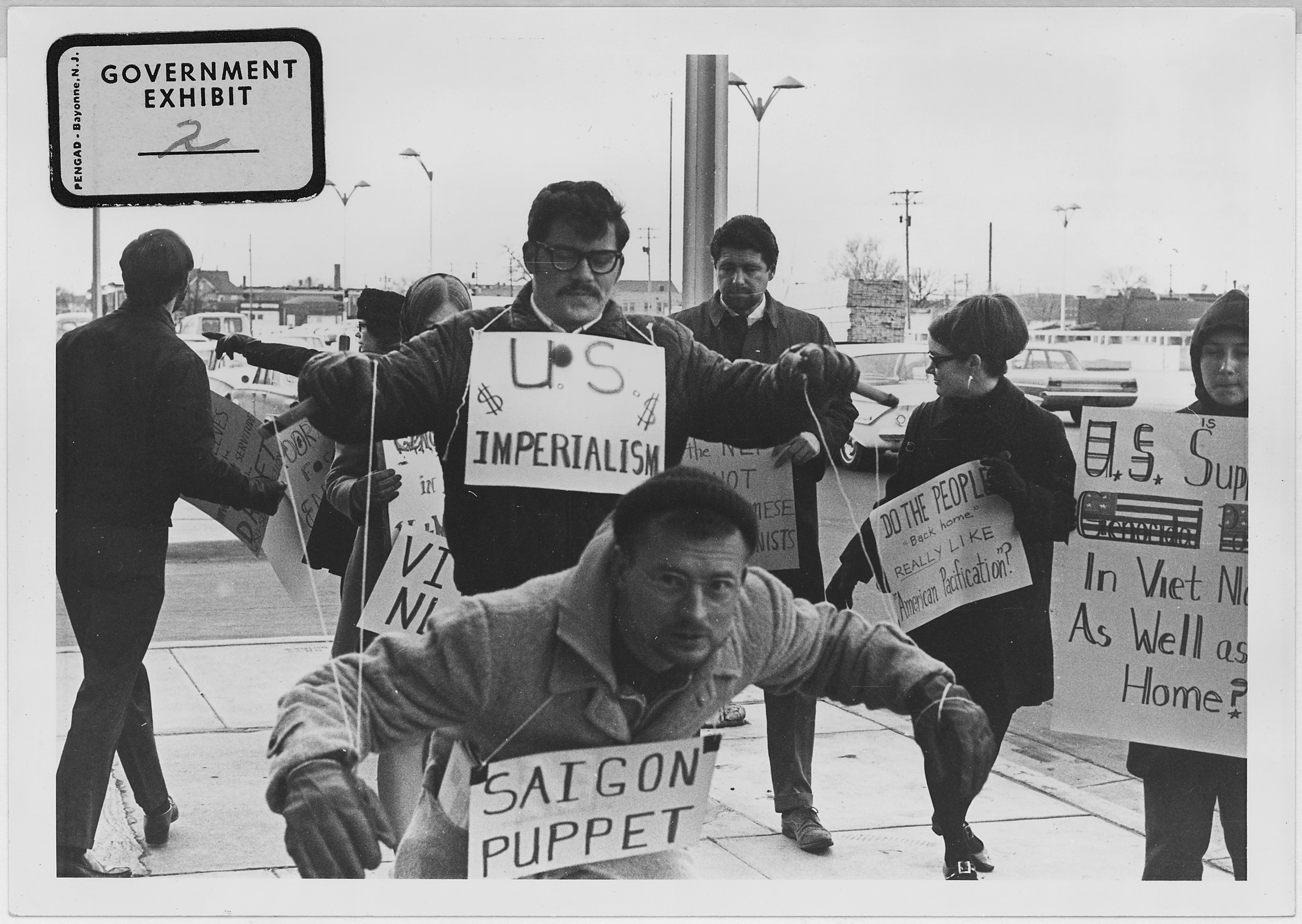|
History Of The United States (1964–1980)
The history of the United States from 1964 through 1980 includes the climax and end of the Civil Rights Movement; the escalation and ending of the Vietnam War; the drama of a generational revolt with its sexual freedoms and use of drugs; and the continuation of the Cold War, with its Space Race to put a man on the Moon. The economy was prosperous and expanding until the recession of 1969–70, then faltered under new foreign competition and the 1973 oil crisis. American society was polarized by the ultimately futile war and by antiwar and antidraft protests, as well as by the shocking Watergate affair, which revealed corruption and gross misconduct at the highest level of government. By 1980 and the seizure of the American Embassy in Iran, including a failed rescue attempt by U.S. armed forces, there was a growing sense of national malaise. The period closed with the victory of conservative Republican Ronald Reagan, opening the " Age of Reagan" with a dramatic change in nati ... [...More Info...] [...Related Items...] OR: [Wikipedia] [Google] [Baidu] |
Buzz Aldrin
Buzz Aldrin (; born Edwin Eugene Aldrin Jr.; January 20, 1930) is an American former astronaut, engineer and fighter pilot. He made three spacewalks as pilot of the 1966 Gemini 12 mission. As the Lunar Module ''Eagle'' pilot on the 1969 Apollo 11 mission, he and mission commander Neil Armstrong were the first two people to land on the Moon. Born in Glen Ridge, New Jersey, Aldrin graduated third in the class of 1951 from the United States Military Academy at West Point, with a degree in mechanical engineering. He was commissioned into the United States Air Force, and served as a jet fighter pilot during the Korean War. He flew 66 combat missions and shot down two MiG-15 aircraft. After earning a Doctor of Science degree in astronautics from the Massachusetts Institute of Technology, Aldrin was selected as a member of NASA's Astronaut Group 3, making him the first astronaut with a doctoral degree. His doctoral thesis, ''Line-of-Sight Guidance Techniques for Manned Orbita ... [...More Info...] [...Related Items...] OR: [Wikipedia] [Google] [Baidu] |
Vietnam War
The Vietnam War (also known by #Names, other names) was a conflict in Vietnam, Laos, and Cambodia from 1 November 1955 to the fall of Saigon on 30 April 1975. It was the second of the Indochina Wars and was officially fought between North Vietnam and South Vietnam. The north was supported by the Soviet Union, China, and other communist states, while the south was United States in the Vietnam War, supported by the United States and other anti-communism, anti-communist Free World Military Forces, allies. The war is widely considered to be a Cold War-era proxy war. It lasted almost 20 years, with direct U.S. involvement ending in 1973. The conflict also spilled over into neighboring states, exacerbating the Laotian Civil War and the Cambodian Civil War, which ended with all three countries becoming communist states by 1975. After the French 1954 Geneva Conference, military withdrawal from Indochina in 1954 – following their defeat in the First Indochina War – the Viet Minh to ... [...More Info...] [...Related Items...] OR: [Wikipedia] [Google] [Baidu] |
Operation Eagle Claw
Operation Eagle Claw, known as Operation Tabas ( fa, عملیات طبس) in Iran, was a failed operation by the United States Armed Forces ordered by U.S. President Jimmy Carter to attempt the rescue of 52 embassy staff held captive at the Embassy of the United States, Tehran on 24 April 1980. The operation, one of Delta Force's first, encountered many obstacles and failures and was subsequently aborted. Eight helicopters were sent to the first staging area called ''Desert One'', but only five arrived in operational condition. One had encountered hydraulic problems, another was caught in a sand storm, and the third showed signs of a cracked rotor blade. During the operational planning, it was decided that the mission would be aborted if fewer than six helicopters remained operational upon arrival at the Desert One site, despite only four being absolutely necessary. In a move that is still discussed in military circles, the field commanders advised President Carter to abort ... [...More Info...] [...Related Items...] OR: [Wikipedia] [Google] [Baidu] |
Iran Hostage Crisis
On November 4, 1979, 52 United States diplomats and citizens were held hostage after a group of militarized Iranian college students belonging to the Muslim Student Followers of the Imam's Line, who supported the Iranian Revolution, took over the U.S. Embassy in Tehran and took them as hostages. A diplomatic standoff ensued. The hostages were held for 444 days, being released on January 20, 1981. Western media described the crisis as an "entanglement" of "vengeance and mutual incomprehension." U.S. President Jimmy Carter called the hostage-taking an act of "blackmail" and the hostages "victims of terrorism and anarchy." In Iran, it was widely seen as an act against the U.S. and its influence in Iran, including its perceived attempts to undermine the Iranian Revolution and its longstanding support of the shah of Iran, Mohammad Reza Pahlavi, who was overthrown in 1979. After Shah Pahlavi was overthrown, he was admitted to the U.S. for cancer treatment. Iran demanded his return in ... [...More Info...] [...Related Items...] OR: [Wikipedia] [Google] [Baidu] |
Watergate Affair
The Watergate scandal was a major political scandal in the United States involving the administration of President Richard Nixon from 1972 to 1974 that led to Nixon's resignation. The scandal stemmed from the Nixon administration's continual attempts to cover up its involvement in the June 17, 1972, break-in of the Democratic National Committee headquarters at the Washington, D.C., Watergate Office Building. After the five perpetrators were arrested, the press and the Justice Department connected the cash found on them at the time to the Committee for the Re-Election of the President. Further investigations, along with revelations during subsequent trials of the burglars, led the House of Representatives to grant the U.S. House Judiciary Committee additional investigative authority—to probe into "certain matters within its jurisdiction", and led the Senate to create the U.S. Senate Watergate Committee, which held hearings. Witnesses testified that Nixon had approved plans ... [...More Info...] [...Related Items...] OR: [Wikipedia] [Google] [Baidu] |
Opposition To United States Involvement In The Vietnam War
Opposition to United States involvement in the Vietnam War (before) or anti-Vietnam War movement (present) began with demonstrations in 1965 against the escalating role of the United States in the Vietnam War and grew into a broad social movement over the ensuing several years. This movement informed and helped shape the vigorous and polarizing debate, primarily in the United States, during the second half of the 1960s and early 1970s on how to end the war. Many in the peace movement within the United States were children, mothers, or counterculture of the 1960s, anti-establishment youth. Opposition grew with participation by the African-American civil rights, second-wave feminist movements, Chicano Movements, and sectors of organized labor. Additional involvement came from many other groups, including educators, clergy, academics, journalists, lawyers, physicians such as Benjamin Spock, and military veterans. Their actions consisted mainly of peaceful, nonviolent events; few ... [...More Info...] [...Related Items...] OR: [Wikipedia] [Google] [Baidu] |
1973 Oil Crisis
The 1973 oil crisis or first oil crisis began in October 1973 when the members of the Organization of Arab Petroleum Exporting Countries (OAPEC), led by Saudi Arabia, proclaimed an oil embargo. The embargo was targeted at nations that had supported Israel during the Yom Kippur War. The initial nations targeted were Canada, Japan, the Netherlands, the United Kingdom and the United States, though the embargo also later extended to Portugal, Rhodesia and South Africa. By the end of the embargo in March 1974, the price of oil had risen nearly 300%, from US to nearly globally; US prices were significantly higher. The embargo caused an oil crisis, or "shock", with many short- and long-term effects on global politics and the global economy. It was later called the "first oil shock", followed by the 1979 oil crisis, termed the "second oil shock". Background Arab-Israeli conflict Ever since the recreation of the State of Israel in 1948 there has been Arab–Israeli conflict in the ... [...More Info...] [...Related Items...] OR: [Wikipedia] [Google] [Baidu] |
Recession Of 1969–70
In economics, a recession is a business cycle contraction when there is a general decline in economic activity. Recessions generally occur when there is a widespread drop in spending (an adverse demand shock). This may be triggered by various events, such as a financial crisis, an external trade shock, an adverse supply shock, the bursting of an economic bubble, or a large-scale anthropogenic or natural disaster (e.g. a pandemic). In the United States, a recession is defined as "a significant decline in economic activity spread across the market, lasting more than a few months, normally visible in real GDP, real income, employment, industrial production, and wholesale-retail sales." The European Union has adopted a similar definition. In the United Kingdom, a recession is defined as negative economic growth for two consecutive quarters. Governments usually respond to recessions by adopting expansionary macroeconomic policies, such as increasing money supply and decreasing int ... [...More Info...] [...Related Items...] OR: [Wikipedia] [Google] [Baidu] |
1945
1945 marked the end of World War II and the fall of Nazi Germany and the Empire of Japan. It is also the year Nazi concentration camps, concentration camps were liberated and the only year in which atomic weapons Atomic bombings of Hiroshima and Nagasaki, have been used in combat. Events Below, the events of World War II have the "WWII" prefix. January * January 1 – WWII: ** Nazi Germany, Germany begins Operation Bodenplatte, an attempt by the ''Luftwaffe'' to cripple Allies of World War II, Allied air forces in the Low Countries. ** Chenogne massacre: German prisoners are allegedly killed by American forces near the village of Chenogne, Belgium. * January 6 – WWII: A German offensive recaptures Esztergom, Kingdom of Hungary (1920–1946), Hungary from the Soviets. * January 9 - WWII: American and Australian troops land at Lingayen Gulf on western coast of the largest Philippine island of Luzon, occupied by Japan since 1942. * January 12 – WWII: The Soviet Union be ... [...More Info...] [...Related Items...] OR: [Wikipedia] [Google] [Baidu] |






